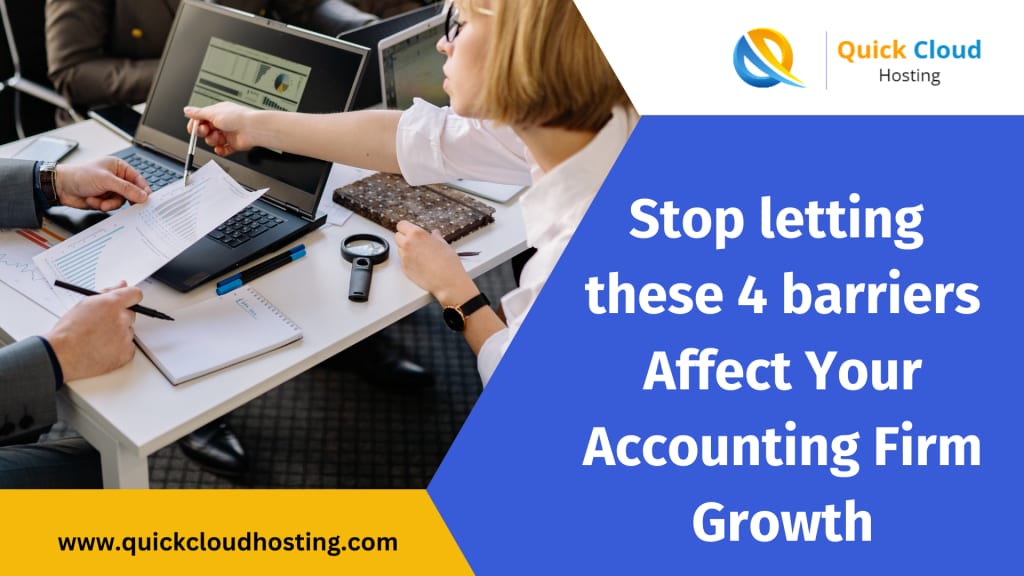Stop letting these 4 barriers Affect Your Accounting Firm Growth
Major types of cloud models

Cloud hosting provides accountants the ability to manage their finances anytime and from anywhere in the world, benefitting them by being able to perform various financial activities with ease. With QuickBooks premier cloud hosting technology, accountants can get a better idea about their investments and improve collaboration through its multi-user features.
Although there are different types of cloud models available in the market, there are three most widely used cloud models that have turned out to be the most beneficial and created a name for them.
Major types of cloud models
IaaS (Infrastructure as a service)
Infrastructure as a Service (IaaS) is a delivery model where businesses can outsource IT equipment, including hardware, servers, and storage. With this service, businesses only pay for what they use, and the service provider is responsible for running and maintaining the equipment.
Paas (Platform as a service)
Platform as a Service, more commonly known as PaaS, allows developers to build and launch applications and services via the internet instead of through a more traditional software application. Think of it as a foundation or middle ground between Infrastructure as a Service (IaaS) and Software as a Service (SaaS). With PaaS, the cloud provider is responsible for hosting the service while users can access it through a web browser or other interface.
SaaS (Software as a service)
SaaS is a software delivery model that uses the internet to give users access to applications that are hosted by a service provider. This is a significant departure from the traditional on-site software distribution model.
Even though cloud technology is becoming more popular in the IT industry, there are still some concerns among small and medium businesses (SMBs). Here are four reasons why your accounting firm might not be ready to move to the cloud:
Lack of knowledge about cloud technology
You may be using cloud technology without even realizing it! Sending emails, online banking, and even using Google Docs are all services that use cloud technology. Even though the term "cloud" is relatively new, the technology has been evolving for a long time.
Cloud computing is the ability to access and store data on the internet instead of your computer’s storage space. This means that instead of hosting services yourself, you can rent them from a cloud provider. A private cloud is an accessible cloud system that is only used by one organization, and it is built on that organization’s infrastructure.
Hybrid cloud is a mix of in-house and outsourced cloud services that work together to provide a specific function for an organization. The market is forecasted to reach $400 billion by 2023, and businesses are expected to prioritize building and implementing cloud strategies in the coming years.
Worried about security
When it comes to storing data, many people believe that it's safer to keep it in their office rather than in the cloud. While this may be true to some extent, there are still a number of risks associated with keeping data in your office, such as malware, hacking, identity theft, and phishing. If you opt for a reliable cloud service, however, you can get a high-quality data security system that will help protect your data from these types of attacks. Even if you choose a shared cloud service, your provider will usually give you the option to have a separate server for your data.
Losing control over data
Even though your data may not always be visible or directly in front of you, that doesn't mean it can't be accessed. QuickBooks premier hosting allows accountants for better control over their data. Plus, it's simpler to control and manage your data and files with a web-based control panel. By using cloud hosting, you're saving yourself from the common daily stresses that come with coordinating with the IT department. This increases your focus and allows you to better devote your attention to business activities.
Cloud setup is expensive
For small to medium businesses, it can be more beneficial to scale their usage of cloud software and IT equipment rather than buying new ones outright. This way, they only have to pay a flat monthly rate which can be easily added to their operational expenses.
As per the surveys there are many businesses which ‘strongly agreed’ that investing in the cloud has lowered costs and delivered efficiencies for their businesses.
One of the common misconceptions is that you can't easily increase or decrease your cloud storage. The reality is, you can! All you have to do is reach out to your service provider and communicate your requirements - they'll be able to make changes to your resources within minutes. So, if you find yourself in need of more (or less) storage, don't hesitate to contact your provider and get the ball rolling.
Migrating to the cloud can be a smooth and hassle free process if you have the rights cloud service provider that understands your business requirements and needs; also be able to provide a customized cloud environment that helps your organization grow.
About the Creator
Akash Pandey
Akash Pandey is a tech enthusiast, writer and a designer at Quick Cloud Hosting (leading provider of cloud hosting & managed services) He also dabbles in writing about technology, Cloud Computing, internet security & other trending topics.






Comments
There are no comments for this story
Be the first to respond and start the conversation.